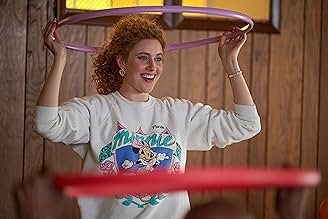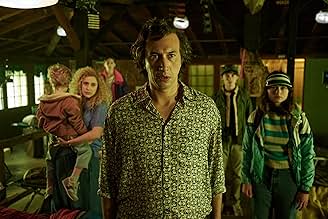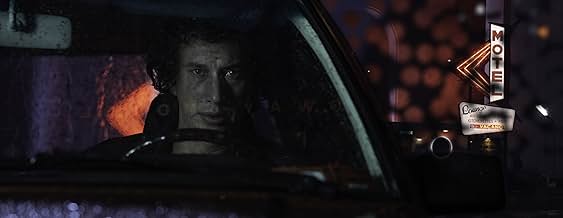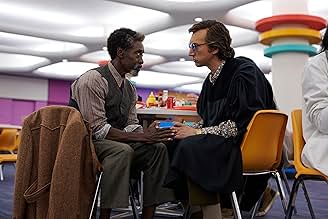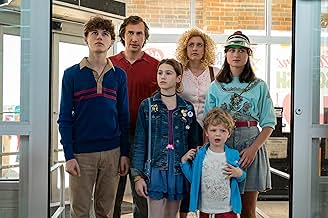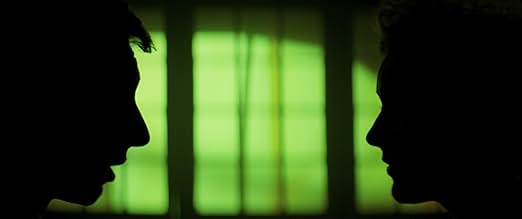PUNTUACIÓN EN IMDb
5,7/10
47 mil
TU PUNTUACIÓN
Dramatiza los intentos de una familia estadounidense contemporánea de lidiar con los conflictos de la vida mientras se enfrenta a los misterios universales del amor, la muerte y la posibilid... Leer todoDramatiza los intentos de una familia estadounidense contemporánea de lidiar con los conflictos de la vida mientras se enfrenta a los misterios universales del amor, la muerte y la posibilidad de la felicidad en un mundo incierto.Dramatiza los intentos de una familia estadounidense contemporánea de lidiar con los conflictos de la vida mientras se enfrenta a los misterios universales del amor, la muerte y la posibilidad de la felicidad en un mundo incierto.
- Dirección
- Guión
- Reparto principal
- Premios
- 2 premios y 25 nominaciones en total
Wickham Reeve
- College on the Hill
- (as Wickham Bermingham)
Mathew Williams
- College on the Hill
- (as Matthew Williams)
Reseñas destacadas
This film has some hilarious one liners and twisted distortions of reality. The first act had me so intrigued I was gripped. Then I was confused. Then I couldn't decide if it was a comedy intentionally or not.
The reality is this film doesn't quite know what it is, and if you think it's going to go somewhere or wrap anything up at the end then you are dead wrong.
Weird for weirds sake is the name of the game. Think of a psychedelic trip by someone who likes the smell of their own farts and decided to write it down.
A future cult classic in the making and I'm sure many people will revere this film for years to come; rewatching it for it's one liners and oddities. For me however one baffling, confusing watch is enough to last a lifetime.
The reality is this film doesn't quite know what it is, and if you think it's going to go somewhere or wrap anything up at the end then you are dead wrong.
Weird for weirds sake is the name of the game. Think of a psychedelic trip by someone who likes the smell of their own farts and decided to write it down.
A future cult classic in the making and I'm sure many people will revere this film for years to come; rewatching it for it's one liners and oddities. For me however one baffling, confusing watch is enough to last a lifetime.
As someone who didn't read the book the movie is based on, i will say that i did not connect with this movie or the characters. Am ok with not connecting with characters but the characters in this movie are hard to understand which is odd because they talk and talk (usually at 100 miles an hour and over each other) so you think they would be all out in the open but it was like a wall between them and me. Like i completely failed to understand what it was that the author was saying about the world or the country when he wrote the book. Though i assume that the book was making some sort of commentary about the state of affairs because this movie feels somewhat too large in scale to just be a movie about coming to term with mortality and the difficulties that can arise in a marriage. Like the movie isn't bad but what are you? I will watch it again when it comes out on Netflix to try and see it with fresher eyes but if the purpose of the movie is to frustrate people so much that we rewatch it multiple times, i will say that they will succeed.
It's obvious a lot of reviewers of this film had no idea what to expect because of having no idea what is in the book it's based on. I'm not criticizing; there's certainly an argument for the fact that an adaptation should work on its own, even if you're unfamiliar. I'm not objective because I've read the book, and I thought it was pretty stunning. As an adaptation, the movie replicated the experience I had reading it-which is what I wanted and expected.
I expected stylized dialogue and characters, with wildly surreal, satirical plot points united by theme rather than subject. If you don't understand what exactly unites the movie's acts and their progression, I struggle to explain it without getting overly spoilery but would suggest deeper investigation and checking out the novel, which is superb. To me, it makes sense. The interaction of the intensely personal with the broadly circumstantial creates a framework to discuss the capital I "Issue" that every human must deal with-and the ways we choose to cope, together and separately.
What I applaud Noah and his actors for is making me care. The book has a brilliant writing style, but its surreality failed to give me some of the visceral sucker punches managed by Adam and Greta in particular.
This film is not going to be for everyone, and I suspect its cast and crew was well aware of this. It's self-consciously extremely intellectual, long, and strange, with humor as dry as a desert. And it's purposefully unsettling. I would argue that it very much should be. It's making us look at something we all face daily-whether we like it or not.
I expected stylized dialogue and characters, with wildly surreal, satirical plot points united by theme rather than subject. If you don't understand what exactly unites the movie's acts and their progression, I struggle to explain it without getting overly spoilery but would suggest deeper investigation and checking out the novel, which is superb. To me, it makes sense. The interaction of the intensely personal with the broadly circumstantial creates a framework to discuss the capital I "Issue" that every human must deal with-and the ways we choose to cope, together and separately.
What I applaud Noah and his actors for is making me care. The book has a brilliant writing style, but its surreality failed to give me some of the visceral sucker punches managed by Adam and Greta in particular.
This film is not going to be for everyone, and I suspect its cast and crew was well aware of this. It's self-consciously extremely intellectual, long, and strange, with humor as dry as a desert. And it's purposefully unsettling. I would argue that it very much should be. It's making us look at something we all face daily-whether we like it or not.
Most of the reviews that I have read thus far were negative, or a bit overly kind. The low rating is likely due to people going out for a light story, expecting to see a disaster action flick or end of the world comedy. This is essentially a reflection on mans fear of his own mortality, or perhaps more specifically on a certain subcultures fixation on their own impending end. If you take the movie as a series of reflections on that idea, and most of the characters as representations of certain personality types, perspectives and ideologies, then it all makes a lot of sense. And, it is pretty damn (darkly) funny as well. Enjoy.
White Noise is, undoubtedly, the strangest movie Netflix has released this year, which is saying a lot given the competition. The plot is all over the place, the dialogue very stylized, and the overall atmosphere is engaging but off-putting. It's the type of movie that is sure to cause a lot of division in audiences.
At its core, White Noise is about a college professor named Jack and his middle class family dealing with their fear of death, but what actually happens is quite complicated. So complicated, in fact, that it feels like three separate movies smashed together. To be fair, the novel is just as ungainly and incoherent, but at least you had the sense that you were the one with the problem. There was a mystique to DeLillo's writing that made it seem like there was a lot going on thematically with the strange choices. But in the movie? It just seems like bad, pretentious writing. I'm not even sure if Baumbach knew what DeLillo's aim was, or if he just guessed.
One symptom of this is that the unnatural dialogue stick out like a sore thumb: in a scene where Jack's wife, Babette, says how open she is with communicating her feelings, Driver says "That is the point of Babette." In another moment, Jack is shopping with his coworker when said coworker suddenly says that Jack's wife's "hair looks important." What is the point of lines like this? Because all it accomplishes is taking you out of the moment and reminding you that you're watching a movie with a script. Not to mention the multiple long, unintelligible "philosophical" monologues that occasionally pop up. Is it an intentional commentary on the hollowness of academia? If so, then why are they presented so uncritically and played dead straight? It's just another disjointed element of the movie that seems unfinished.
But even if the script fails them, the cast and tech crew don't give up on trying. Driver and Gerwig give very different performances, the former acting almost like an intentional caricature of a sitcom dad, and the latter trying to be serious the whole time. And yet it's one of the few disparate combinations in the film that actually pays off: their acting is convincing as a real couple. Gerwig, in particular, brings emotion to scenes that were completely absent of it on the page. The production design and score are also on point, creating a distinct and interesting atmosphere that also furthers the film's supposed social commentary. But none of this is quite enough to save White Noise from itself and its shortcomings.
The best part of the film is far and away the end credits. I'm not saying that as some sort of flippant joke about the movie's quality, it's a genuinely incredible sequence. Somehow it captures the exact type of weirdness and existentialism and fun that's absent from the rest of the movie. It's so good that, in all honesty, you could probably skip the rest of the movie for it. White Noise is consistently watchable and unique, unlike anything else you'll see this year. But it's aimless, confused, and ultimately baffling to make any significant impact.
Final Score: 62/100.
At its core, White Noise is about a college professor named Jack and his middle class family dealing with their fear of death, but what actually happens is quite complicated. So complicated, in fact, that it feels like three separate movies smashed together. To be fair, the novel is just as ungainly and incoherent, but at least you had the sense that you were the one with the problem. There was a mystique to DeLillo's writing that made it seem like there was a lot going on thematically with the strange choices. But in the movie? It just seems like bad, pretentious writing. I'm not even sure if Baumbach knew what DeLillo's aim was, or if he just guessed.
One symptom of this is that the unnatural dialogue stick out like a sore thumb: in a scene where Jack's wife, Babette, says how open she is with communicating her feelings, Driver says "That is the point of Babette." In another moment, Jack is shopping with his coworker when said coworker suddenly says that Jack's wife's "hair looks important." What is the point of lines like this? Because all it accomplishes is taking you out of the moment and reminding you that you're watching a movie with a script. Not to mention the multiple long, unintelligible "philosophical" monologues that occasionally pop up. Is it an intentional commentary on the hollowness of academia? If so, then why are they presented so uncritically and played dead straight? It's just another disjointed element of the movie that seems unfinished.
But even if the script fails them, the cast and tech crew don't give up on trying. Driver and Gerwig give very different performances, the former acting almost like an intentional caricature of a sitcom dad, and the latter trying to be serious the whole time. And yet it's one of the few disparate combinations in the film that actually pays off: their acting is convincing as a real couple. Gerwig, in particular, brings emotion to scenes that were completely absent of it on the page. The production design and score are also on point, creating a distinct and interesting atmosphere that also furthers the film's supposed social commentary. But none of this is quite enough to save White Noise from itself and its shortcomings.
The best part of the film is far and away the end credits. I'm not saying that as some sort of flippant joke about the movie's quality, it's a genuinely incredible sequence. Somehow it captures the exact type of weirdness and existentialism and fun that's absent from the rest of the movie. It's so good that, in all honesty, you could probably skip the rest of the movie for it. White Noise is consistently watchable and unique, unlike anything else you'll see this year. But it's aimless, confused, and ultimately baffling to make any significant impact.
Final Score: 62/100.
¿Sabías que...?
- CuriosidadesThis is Noah Baumbach's first time writing and directing a book-to-screen adaptation, and only his second adaptation after co-writing the screenplay for Fantástico Sr. Fox (2009).
- PifiasIn the opening scene, many vehicles featured in Murray's crash sequence reel are from the 1990s and 2000s, whereas White Noise takes place in the 1980s.
- Créditos adicionalesThere is a scene at the end where the characters dance in a supermarket. As the credits start to roll, this sequence is played partially in reverse as the music continues to play normally.
- Banda sonoraLincoln Portrait
Written by Aaron Copland
Selecciones populares
Inicia sesión para calificar y añadir a tu lista para recibir recomendaciones personalizadas
- How long is White Noise?Con tecnología de Alexa
Detalles
- Fecha de lanzamiento
- Países de origen
- Sitio oficial
- Idiomas
- Títulos en diferentes países
- Ruido De Fondo
- Localizaciones del rodaje
- Wellington, Ohio, Estados Unidos(Storefronts are built out and set up for July filming)
- Empresas productoras
- Ver más compañías en los créditos en IMDbPro
Taquilla
- Presupuesto
- 145.000.000 US$ (estimación)
- Recaudación en todo el mundo
- 71.728 US$
- Duración
- 2h 16min(136 min)
- Color
- Relación de aspecto
- 2.39 : 1
Contribuir a esta página
Sugerir un cambio o añadir el contenido que falta



